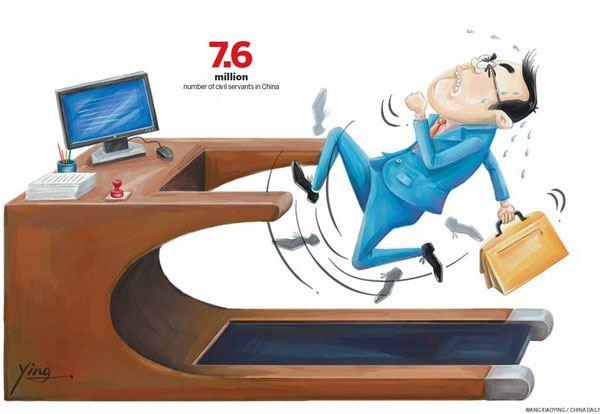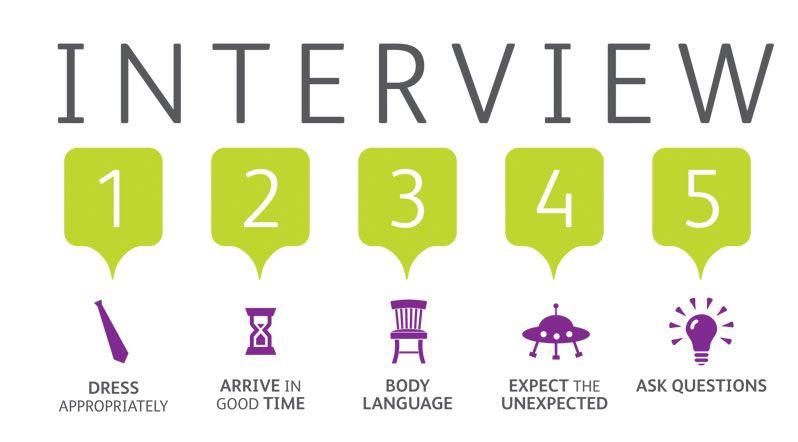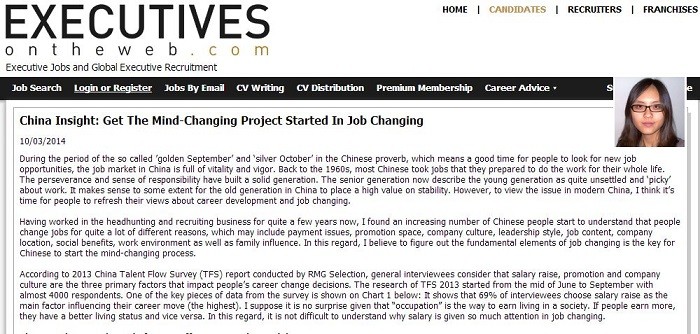
The government’s anti-corruption drive has partly resulted in a decline in the number of people willing to work for the civil service
Dai Qiming’s memories of his first day as a civil servant are as fresh as those of the day he left the service.
Dai gazed across at a vast space in Xintiandi, Shanghai’s most cosmopolitan district, where he spent seven years overseeing expat communities, and the rows of 40-story commercial towers that radiate in every direction.
The area is proud of its record as a heavy taxpayer. It houses the headquarters of about 50 multinational corporations and is home to flagship stores for top-end luxury brands, including Vera Wang and Harry Winston.
“I thought I’d become glamorous along with the area. I didn’t. I must give up now,” says Dai, whose “dream job” failed to withstand the seven-year itch.
The anti-corruption and austerity campaign initiated by the new Party leadership has swept through the 7.6 million workers in China’s public sector and eradicated the “gifting rituals” that were once a common practice for people intent on wooing civil servants.
The growing vitality of the private sector and the government’s endorsement of market forces have also dissuaded an increasing number of people from becoming civil servants, a position that was considered a “golden rice bowl” – a guarantee of lifelong employment – for years, if not decades.
So far this year, in some coastal regions, such as Zhejiang province, the number of applicants for civil servant posts has fallen by 25 percent compared with last year.
Austerity campaign
The government’s anti-corruption, pro-austerity campaign has been a major factor in a decline in the growth of the country’s luxury goods market, which fell to just 2 percent in 2013, compared with a staggering 30 percent in 2011, according to a December study by the consultancy Bain & Co.
The number of officials receiving gifts has also declined markedly since the first half of last year.
A random survey of 100 civil servants from eastern, western and central China, conducted by Beijing News in January, showed that 80 percent of respondents received no gifts last year, a stark contrast to the old days when officials regularly received prepaid shopping cards, wine or cigarettes.
“Some companies used to give high-end bags or watches to my supervisors. I received some shopping cards. Nowadays, no one dares to accept gifts because they don’t want to risk losing their jobs. If that’s the case, what’s left for me?” Dai asks.

The well-documented end of the lavish lifestyles enjoyed by top government officials and the focus on rooting out corruption among both “flies and tigers”, a synonym for low and high-ranking officials, has resulted in fewer people wanting to work for the state, according to Robert Parkinson, founder and managing director of the international recruitment group RMG Selection.
Dai says the austerity drive was the straw that broke the camel’s back, and he spent two years mulling “a change of life”. Dai graduated with honors from the Public Administration Department of Fudan University in Shanghai, but because he doesn’t come from a well-to-do family, he was in dire need of the stability offered by a government post.
“I chose to work at the sub-district level because it was the ‘most practical’ choice. Put simply, it’s about power and money,” he says.
The desire to land a civil service post has long been representative of employment priorities among the country’s brightest and best. Public posts are the perfect fit and encapsulate the aspirations of many Chinese: a decent income, high social status and a promising future.
Life was pretty good in 2008, Dai says. His annual post-tax net income was 180,000 yuan ($29,000, 21,150 euros), with about 20 percent coming from various subsidies, shopping coupons and discount cards converted into cash.
Work was laid-back and featured a typical troika of endless cups of tea, a selection of free newspapers and a cellphone. He was comfortable dealing with foreign businesspeople, who were friendly, courteous and, most importantly, fully conversant with the “hidden rules” of business.
“When they needed to fill out paperwork for work visas or business licenses, they never arrived empty-handed. During holidays such as Lunar New Year, my ‘gray’ income could reach five figures,” Dai says.
Salary stagnation
But the perks once associated with being a civil servant have dwindled. As part of the new anti-corruption measures, lower-ranking civil servants will no longer be allocated official cars for personal use, and a wave of anti-graft campaigns have increased scrutiny of government officials.
Dai also saw his salary stagnate. With no gray income, his earnings in 2013 fell by 30,000 yuan compared with five years earlier.
For others, though, the reduction in earnings is not the only thing prompting them to leave jobs that were once the envy of their peers.
A former diplomat, who declined to be named, says his salary was “highly disproportionate” to the extremely long hours he worked.
“My monthly salary at the Ministry of Foreign Affairs was a little more than 3,000 yuan in 2007, but during the peak seasons, I could work as many as 60 hours a week,” he says. His work situation and a growing disillusion with “diplomatic rhetoric” led him to resign in 2012, after spending four years as an attache in Kuala Lumpur.
He is now hoping to gain expertise in business management, which he regards as a “more useful tool” for planning his career. “I sensed it was insufficient to only master politics. I have an urge to learn more about the economy and the market,” he says.
He joined a state-owned enterprise to “get a sense of what the real business world is like”, and plans to move overseas to study his chosen subjects.
Liu Hong, a researcher at the University of Shanghai for Science and Technology, who is conducting a key national project into the development of civil servants and their work, says the crackdown on corruption might help filter out those who regard government posts as “lucrative and easy”.
“The campaign will cool people’s unreal expectations about the job and reinforce what it should be. Eventually, only those who demonstrate a strong public service ethos will remain in their posts,” she says.
According to Parkinson of RMG, more people are becoming frustrated with the slow pace of work, the relatively low wages and the dull existence of civil service workers.
“As more and more young Chinese are exposed to the outside world and their families’ views become less important to them, or rather they become increasingly confident challenging those views, they become aware that there are far more lucrative and interesting positions in commerce and industry – sectors with a high demand for well-educated, intelligent and, most importantly, ‘thinking’ graduates,” he says.
Dai notices that the tide had turned when people expressed a willingness to trade a public service desk job for the vitality of the private sector. For example, the dominant topic on his Alma Mater’s online chat room has changed from “Civil servant exam preparation” to “Ten tips on how to quit a public post”.
According to a survey conducted by Henan Business Daily in February, more than 60 percent of civil servants in Henan provincial government departments and public institutions have considered quitting.
Lack of candidates
In Zhejiang, the country’s most affluent province, about 230,000 people signed up for the entry exam to become provincial civil servants this year, a decline of 25 percent from 2013, according to official data.
Wu Song, the mayor of Baoshan, a city in Yunnan province, expects the number of aspiring civil servants to decline in the coming years.
“Traditionally, the Chinese believe that a good scholar is the perfect person to become an official. But things have changed. I think college graduates will have a wider range of career options, such as business, agriculture or science, rather than simply becoming civil servants,” he says.
The central government’s reduction of administrative power and its endorsement of market economics have also provided young people with an incentive for change.
Premier Li Keqiang has repeatedly encouraged college graduates to start their own businesses and has promised a package of policies to support young entrepreneurs.
Li Kai, who will graduate from East China Normal University this year, regards becoming a civil servant as a “job option” rather than a “dream offer”. After spending time as an intern at a local government agency, Li realized he was more interested in the business and corporate world. He has received five job offers from multinational corporations. His classmates have all taken the civil service entry exam.
“The ‘civil servant heat’ is fueled by the perceived social status, strong job security and employee benefits. But people should ask themselves whether the job fits their personality and plays to their strengths,” he says.
Simon Lance, China regional director of the recruitment agency Hays, has also noticed a movement to the private sector from China’s civil service.
“The reasons most regularly cited by candidates who wish to pursue careers in the private sector are related to management style, career progression and professional development,” Lance says, adding that many private businesses are investing heavily in training and development programs.
But gaining a well-paid job is not as easy as one might imagine. Dai says he lacks the skills employers are seeking, especially for positions with competitive salaries. “They are either seeking people with certificates in public accounts and financial analysis, or those who have passed the national judicial examination. I have none of those skills. I’m only good at administrative work,” he says.
Lyu Chenyan, who recently resigned from the Shanghai Municipal Bureau of Local Taxation after seven years, says she could not stand the “bureaucracy and hierarchy”. Except for few positions dealing with government affairs, she says her competitive edge is near zero compared with new graduates. Instead, she has decided to study international development at Columbia University in New York.
“During those seven years, I eventually realized that I was not suited to the humdrum, predictable life of the civil service, but if I were to switch jobs right now, I would feel inferior to my peers,” she says.
Contact the writers through [email protected]
Shi Jing and Hu Yongqi contributed to this story.、
Read the original link at:http://africa.chinadaily.com.cn/weekly/2014-03/14/content_17347015.htm









 An interesting point I noticed in this report is about the job changing situation with women: Decades ago, Chinese women were not allowed or not appreciated to work outside. The fast development in the society allows Chinese women to touch the outside environment. It can be seen in Chart 2 and Chart 3 the top 3 factors affecting job changing decisions are exactly the same in male and female. Furthermore, the data are basically at the same level. From taking the role of housewives to getting prepared to be female elites, Chinese women seems adjust themselves very well in career development.
Chart 2 Job changing factors in male
An interesting point I noticed in this report is about the job changing situation with women: Decades ago, Chinese women were not allowed or not appreciated to work outside. The fast development in the society allows Chinese women to touch the outside environment. It can be seen in Chart 2 and Chart 3 the top 3 factors affecting job changing decisions are exactly the same in male and female. Furthermore, the data are basically at the same level. From taking the role of housewives to getting prepared to be female elites, Chinese women seems adjust themselves very well in career development.
Chart 2 Job changing factors in male
 Chart 3 Job changing factors in female
Chart 3 Job changing factors in female
 During the past years of my staying in this culturally diverse country, I have heard quite a lot of interesting stories and history about China and Chinese culture. A very important example of this can be seen in chart 4 – “Promotion”, which is closely related with the deep rooted Chinese cultural importance placed on promotion and advancement. According to the famous Chinese ancient encyclopedia Lu Shi Chun Qiu, every single employee wants to get promoted in the hierarchical system. It is regarded as a fundamental need for people’s self-actualization. Back to the modern society, getting promotion is regarded as the recognition of employees’ hard-working and achievements.
Chart 4 Influence of promotion in job changing by age groups
During the past years of my staying in this culturally diverse country, I have heard quite a lot of interesting stories and history about China and Chinese culture. A very important example of this can be seen in chart 4 – “Promotion”, which is closely related with the deep rooted Chinese cultural importance placed on promotion and advancement. According to the famous Chinese ancient encyclopedia Lu Shi Chun Qiu, every single employee wants to get promoted in the hierarchical system. It is regarded as a fundamental need for people’s self-actualization. Back to the modern society, getting promotion is regarded as the recognition of employees’ hard-working and achievements.
Chart 4 Influence of promotion in job changing by age groups
 Though promotion ranks the second reason for people who are looking for new job opportunities, the need to be promoted varies in different age groups. Taking a look at the line graph (Chart 4) about promotion in different age groups, the influence of promotion is increasing from age of 18 to 35. People who are 30 to 35 years old are at the stage of golden career. Once they are at the position that they are satisfied, the need and want of changing jobs to simply get promotion becomes less strong. Comparatively, people at the younger age group might move on with their career because of a good promotion space in the new company.
The third element on the Chart 1 is really of great importance. Half of interviewees ‘hop’ to other companies simply because they like the company culture. Things like company values, working environment, collegial relationships, and core leaders matter to a large extent. The reason why it (company culture etc) matters is that in fact attracting talent is only the first step, and in fact perhaps the more important question is how to retain talent in a company. According to my experience in recruitment, more than 90% of the typical leaving reasons are actually related to his or her line manager or the management style of the company. However, lots of companies have never paid any attention on company culture building. Company culture equals the ‘smart power’ of the company. The influence of this ‘smart power’ is well penetrated in the operation process, which can be brought to not only clients as well as job seekers but employees as well.
Having contributed to many job interviews, I have quite a few interviewees telling me that they leave their current company simply because of the terrible working atmosphere, poor colleague relationship and punishing system which all belong to part of the company culture building. Money is an important element when people considering changing jobs, but I suppose nowadays people start to care about more than that. To create a unique corporate culture is extremely important for the competing enterprise. As an essential part of corporate culture, the branding of the employer not only enhances the sale-value, also able to attract talent for the enterprise
The last one on the list of Chart 1 is opinions from families. To be honest, I dare not agree with the argument that families don’t play a part in the job change decision making process. In the traditional Chinese culture, actually family is a very influential factor when people consider something very important. To show you this clearly, I would like to illustrate family opinion with a case of headhunters. Headhunters sometimes need to deal with cases of relocation. At this moment, opinions from family members can represent the decision-making power. Relocation might involve the moving of the whole family, which indeed need agreement from every family member.
Though promotion ranks the second reason for people who are looking for new job opportunities, the need to be promoted varies in different age groups. Taking a look at the line graph (Chart 4) about promotion in different age groups, the influence of promotion is increasing from age of 18 to 35. People who are 30 to 35 years old are at the stage of golden career. Once they are at the position that they are satisfied, the need and want of changing jobs to simply get promotion becomes less strong. Comparatively, people at the younger age group might move on with their career because of a good promotion space in the new company.
The third element on the Chart 1 is really of great importance. Half of interviewees ‘hop’ to other companies simply because they like the company culture. Things like company values, working environment, collegial relationships, and core leaders matter to a large extent. The reason why it (company culture etc) matters is that in fact attracting talent is only the first step, and in fact perhaps the more important question is how to retain talent in a company. According to my experience in recruitment, more than 90% of the typical leaving reasons are actually related to his or her line manager or the management style of the company. However, lots of companies have never paid any attention on company culture building. Company culture equals the ‘smart power’ of the company. The influence of this ‘smart power’ is well penetrated in the operation process, which can be brought to not only clients as well as job seekers but employees as well.
Having contributed to many job interviews, I have quite a few interviewees telling me that they leave their current company simply because of the terrible working atmosphere, poor colleague relationship and punishing system which all belong to part of the company culture building. Money is an important element when people considering changing jobs, but I suppose nowadays people start to care about more than that. To create a unique corporate culture is extremely important for the competing enterprise. As an essential part of corporate culture, the branding of the employer not only enhances the sale-value, also able to attract talent for the enterprise
The last one on the list of Chart 1 is opinions from families. To be honest, I dare not agree with the argument that families don’t play a part in the job change decision making process. In the traditional Chinese culture, actually family is a very influential factor when people consider something very important. To show you this clearly, I would like to illustrate family opinion with a case of headhunters. Headhunters sometimes need to deal with cases of relocation. At this moment, opinions from family members can represent the decision-making power. Relocation might involve the moving of the whole family, which indeed need agreement from every family member.